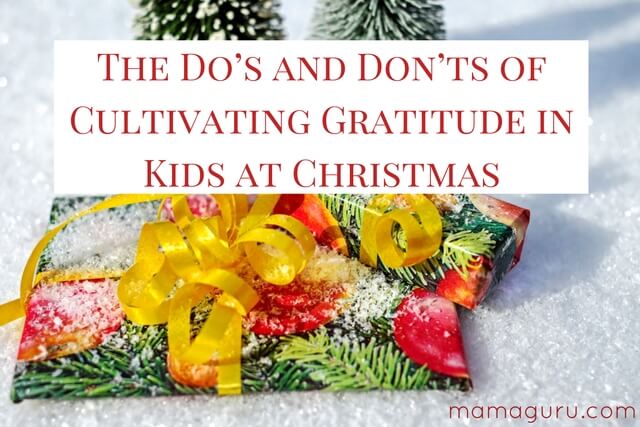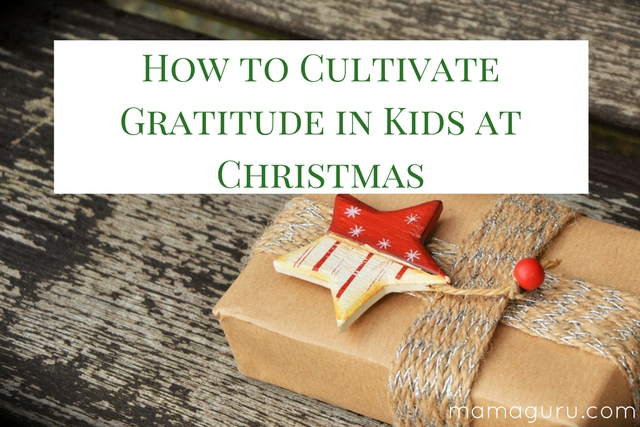The best gift you can give your child for Christmas is an attitude of gratitude, but that’s a tall order in our current culture. But Christmas is the ideal time to cultivate gratitude in kids! Teaching children gratitude protects their natural purity of heart. Think about what the word, spoiled, means: to take something good and put it in conditions where it will rot through neglect. We’ve seen it happen in the crisper drawer of the refrigerator many times, and it’s not a pretty sight. Spoiling children has the same effect; part of their hearts diminish when we overwhelm them with a material-based appreciation of the world, rather than nurturing the core principles of gratitude, contentment and generosity they need for sustained happiness.
Often times we don’t even realize how actively we direct children away from gratitude during the holidays. We unwittingly prompt and encourage greed. Think about what message a child receives when they are constantly asked what toys they want, instructed to make a list of them, told to write a letter outlining those wants, and then stand in line for hours to make their requests in person. That’s a lot of energy driving kids’ attention towards material desire. We also add daily practical jokes, funny surprises and small gifts gaining momentum towards the big day of gifts galore! Is it any wonder they can seem greedy at times?
On the other hand, how much time and energy do we spend directing children towards gratitude during the holidays? After the Thanksgiving ritual of counting our blessings, what do we do? Immediately go shopping. Lots of people try to inject meaning in their celebration of the holidays, but think in terms of percentages and pizzazz. Which message is given the most frequently and accompanied by twinkling lights and jingle bells to boot? Lip service doesn’t work for kids. They are shrewd creatures who learn through observation and experience.
That’s great news, because that means we can shape their holidays and hearts in a direction that moves towards contentment, generosity and gratitude and away from greed, expectation and entitlement. Here are the Do’s and Don’ts in cultivating gratitude in kids during the holidays
What Not to Do to Cultivate Gratitude in Kids at Christmas
- Don’t let your kids watch commercial TV.
Toy companies hire advertisers who work with child psychologists to make compelling commercials to manipulate children into pestering their parents for the IT toy. Nefarious, isn’t it? The fact is, if it weren’t for advertisers, there wouldn’t be an IT toy every year. Children are unique individuals and naturally gravitate towards toys that match their interests, except when they are being heavily marketed to. Besides, the nature of commercials is to keep children in a perpetual state of want, which is the exact opposite of gratitude. The solution is easy. Take a break from screen time, watch PBS or videos exclusively, or stream favorite shows without commercials.
- Don’t encourage kids to write a Wish List.
Children are often told to write a list of presents that they hope to receive. Before you do that, think about how that clearly points your child’s attention towards wanting things and away from enjoying what they already have. The message is to stop their play, research all the toys out there, imagine owning them, and then write them down. Of course, they will feel a rush of greedy hopefulness! Their attention is now focused on desire, not gratitude.
I keep hearing the term Christmas List thrown around incorrectly. A Christmas List is the list of presents you are planning on giving other people; a Wish List is a list of what you hope to get. The fact that our society has so widely confused this speaks volumes to the state of gratitude and greed these days.
If you are unsure of what to get your child, watch him or her play. See which toys are being used and which are not. Talk to parents who have children a few years older than yours to get an idea of what toys are popular for their upcoming ages. Google away! There are tons of gift guides out there that you can find by searching your child’s age, gender and interests. You could also consider if it is wise to put a lot of effort into getting things you never even knew existed. Food for thought.
- Don’t do Elf on a Shelf!
This is a daily reminder for children to think about presents. He’s lively and funny and captures their attention, but think about where he points that attention. Be good, so you will get presents! It pulls children out of the present moment and out of contentment. It generates excitement about getting, not giving.
- Don’t tell your kids to write a letter to Santa.
As adults we find these letters charming with all the creative spelling and sincerity; however, again, this points children’s attention towards asking for things that they want. Wouldn’t it be better to write a thank you letter to Santa on Christmas or the day after? It would be just as charming and sincere, but it would be fanning the flames of gratitude, rather than the usual writing prompt geared at greed.
- Don’t ask children what they want for Christmas.
Every time this question is asked, you are telling a child to think about wanting to acquire something. It’s in complete contradiction to cultivating a grateful heart.
I’m always surprised when strangers at the supermarket ask my children what they want for Christmas. I know they are just trying to be friendly, but it’s sad that this is their conversation opener. When my kids were very little, I was shocked because I never asked them that question. I don’t take my kids to toy stores very often and they don’t watch commercial TV. Until they were in first or second grade, they didn’t have a clue what to say. Even now, they struggle to answer that question. I often gently intervene, saying, “Oh, we like to focus on giving, not getting,” or, “We love surprises!”
A child telling you what they want unprompted is a very different matter. It’s perfectly fine to listen to them express their excitement, although if you spot an opportunity to drop in a line about gratitude or giving, do so. What I’m advocating is not actively putting a child into a desirous frame of mind. Keep them content and they will be much happier people.
- Don’t do gifty Advent calendars.
Traditional Advent calendars have windows with pictures and/ or Bible verses. These generate building excitement in a direction that has nothing whatsoever to do with presents. If you are raising your child in a faith, they are wonderful opportunities to engage and excite children about the birth of Jesus Christ. When I was little, my church gave us Advent calendars with different tasks that we could do for others. It was so exciting to read a book to a younger sibling, draw a picture for mom, clean up your mess without being told. All of those actions prompted generosity.
These days, many children receive a present every single day of December. Getting, getting getting! I’ve seen a gorgeously wrapped stack of 24 books, little boxes, tiny drawers and baby socks filled with small gifts or candy. These are super fun, but think about what message they are giving. Think about how that builds excitement towards Christmas morning which will have even more presents! It’s sad to transform an opportunity to encourage children be generous and connected with meaning into a warped exercise in gimme.
I’m going to recommend a few books, and I must tell you if you that if you use the links I provided, I will earn a small commission.
How to Cultivate Gratitude in Kids at Christmas
Ok, ok. That’s enough of the don’ts. You might be feeling like the Christmas I’m imagining is less fun. Not at all! Christmas is a joyous time of year and there are lots of ways to celebrate with meaning and gratitude.
- Help your child make presents for their family and friends.
The opposite of getting is giving, so encourage your child’s natural generosity. Because children can’t afford to buy presents, come up with a project where they can make them. I like homemade presents more than just giving them money to spend, because money is an abstract concept for children and shopping doesn’t invest them in the act of generosity as much.
The time and effort your children use in making gifts makes their sweet little hearts grow. They are giving all that they have and it’s a beautiful experience to witness. An afternoon spent making homemade presents is a powerful lesson in gratitude. Later, when it is giving time, they get to feel the warm fuzzies of making someone else happy. Isn’t that better than to only feel their own giddiness at getting? It’s so amazing to watch a child completely focused on another person’s happiness, and that happens when they are invested in giving.
Here are some ideas of homemade projects that can be gifts: homemade cookies, cards, paintings, molded crayons, homemade ornaments, playdough snowballs, books, homemade jewelry and just about any craft under the sun.
- Participle in a Giving Tree.
Many churches, schools and communities have Giving Trees where you can buy a gift for a person in need. Let your child choose the request he or she would like to fulfill and then go shopping for that person together. This naturally prompts discussions about the wants vs. needs, the disparity of resources in our world, and our role in helping others. If your child has an allowance, then spending his or her own money for the gift could make an even stronger impact.
- Read the Little House of the Prairie series.
The Little House on the Prairie books are so wonderful and each has at least one Christmas in it. The Ingalls children are over the moon to receive just a single piece of candy. They make their own presents resourcefully and with great joy. Their utter delight with the simplest of gifts is contagious and beautifully illustrates a simpler, gratitude-based way of life. I want to put bells and whistle around the word, contagious, because it is apt. Laura’s gratitude is contagious; it will infect your children’s hearts. Christmas is a happy time because they are together and can scrape together a feast from meager provisions.
Of course there are many great Christmas storybooks that teach values. Read those too! There is something particularly moving though, of getting to know a family well and seeing Christmas as a small part of their overall life. There are so many great examples of contentment, resourcefulness and gratitude for mere survival in these books that they will definitely help mold your child’s heart and shape their world view in a fundamentally grateful way.
- Have your children give away the toys they’ve outgrown.
Besides tidying your house, this activity points out to kids how much they have and how little they use a lot of it. In enables them to feel good about giving toys they no longer use to children who don’t have as much. Again, any opportunity to prompt children to recognize the gifts they already have cultivates a sense of gratitude.
- Give experiences instead of gifts.
Instead of giving presents to all your nieces and nephews, why not get the whole family together for an ice-skating trip or a sleigh rides with cocoa? Wouldn’t that create more joy? It would also reframe holidays away from receiving and towards simply enjoying your beloveds. Or what about giving a child tickets to a game or a show they might like rather than a physical gift? Experiences may not generate quite the same gurgling buzz on Christmas morning, but they create lasting memories and usually end up being more appreciated than yet another toy in the mountain of gifts. The less stuff is emphasized, the less value a child will put on it, which, in turn, promotes gratitude and a different way of seeing the world.
In Stress Free Holidays: Bring Back Joy & Peace, I give an entire list of creative Gifts of Experience you can give to both children and adults. These are fabulous presents that your friends and family will love. It’s great to give someone a happy day and a great memory instead of a clutter problem.
- Give less gifts!
The more you emphasize gifts, the more your children will. Plain and simple. If you’ve noticed flashes of greed or ingratitude in your child, that’s a learned attitude which can be unlearned. In the interest of magic and joy, we sometimes impulsively buy too much. (Hence, item 4: how is it that we always have too much stuff and why do we keep buying more?) As parents, we set the expectations for our children. When we go overboard, they go overboard. Tone it down. The less your child receives, the more grateful they will be for what they have.
Children learn by example, so if we show them that Christmas is about getting a payload of presents, that’s what they will learn, no matter what platitudes we preach. Most children know that there are two answers to the question: What is Christmas about? The correct answer is Jesus, but the real answer is presents. That’s sad, but if you look at the context of how we celebrate in our culture, it’s true.
But that can change this very minute. You control how your family chooses to celebrate. If you are mindful of the small choices you make throughout the holiday season, you can absolutely have a meaningful, gratitude-based, joyful Christmas. You can give your children the best gift at all, the one they would never think to put on a Wish List, but the key they need for lifelong happiness: a grateful heart.
Want more help creating a joyful and peaceful Christmas?
Read Mamaguru’s Guide: Stress Free Holidays: Bring Back Joy & Peace. It teaches you how to apply mindfulness and promote meaning in your holidays, as well as giving you a host of holiday hacks to make things run a little more smoothly.
This post was proudly featured in Working Mommy Abroad’s Friday link up and











Another favorite story about giving that I love is Gift of the Magi about the married couple struggling to buy secret Santa gifts for their spouse. SO sweet. Great reminders! I really hate wish lists personally. Takes the fun out of it for me. Pinned this to my holiday board!!
Wow. This is a lovely advice for mindful parenting. Love this. Never thought through these. Awesome read and absolutely insightful for me. Your points are sure to stay at the top of my mind – Thank you!
Feel free to do what works for you, Rebekah! The most important thing to do is be mindful of the overall message your are giving. It’s really about the cumulative effect of constantly directing our children’s attention towards wants and getting.
That’s great, Sane Mama! I think it’s important to add opportunities to cultivate gratitude, because our culture definitely is blasting a materialistic viewpoint.
Yes, Marla! It upsets me quite a bit, but I also believe we have the power to change them. After all, culture is a self-defining concept. Let’s start a gratitude revolution!!
s
That’s great, Alicia! I wish you happy, stress-free holidays!!
Oh Amanda, that’s so wonderful! My church collects money from kids to buy animals, but it’s great to do that as a family!!!
This post has given me a lot to think about. Our boys don’t watch much TV but I do ask them what they would like for Christmas. I like your point of teaching your children to focus on giving instead of focusing on what they may be receiving.
These are great ideas – we don’t do any of the don’ts, but I will definitely use some of your positive suggestions.
I agree completely! The holidays have become so over-commercialized and kids are so heavily marketed to, it’s sad!
I really love this! I have thought Elf on the Shelf is the worst since it first reared it’s ugly (and creepy) head a few years ago. Like, shouldn’t we be teaching our kids to behave YEAR ROUND? But that’s a whole other can of worms…
I love your suggestions for “Do’s”. We actually just went through my older daughter’s toys yesterday. It’s needed done for quite some time, but Christmas is a good extra motivator. I am planning on doing some more volunteer and giving type things this year and include my kids in them, so I hope they learn something from it. 🙂
These are great! We have never done an advent calendar but I love the idea of a task-oriented one, doing good deeds for others and giving of ourselves. We love saving our change throughout the year and then spending a chunk on the Samaritan Purse gift catalog. The kids LOVE being able to buy goats, chickens, blankets, warm meals and Bibkes to people across the world.
Thanks for sharing!
I love this post!! Great way to refocus their attention on what is really important!!
THEFOREVERTEACHER
I love all the things that you can do to help cultivate gratitude. Donating toys they have outgrown, giving experiences are all great ideas.. While I see your point in the not writing a list, but I think it can be done in a non spoiled way. Making sure they know they won’t get everything on the list. And not focusing on the list. Allow them to write it, then move on with the day and do things from the what to do part of the list.
Brittany, I LOVE that idea! It focused children on generosity!
It is hard raising kids in this society. I do believe limiting TV and not making lists are ways of not making them think they are entilted to getting whatever they want on Christmas. I like to make list of how we can help others and special gifts we can make together.
That’s great, Julie! It sounds like your family is grounded, which requires mindfulness and effort in our whirlwind culture. Keep it up!
Oh, how wonderful, Kristen! I have definitely done some of these too, but didn’t like the results, so I stopped. I honestly don’t understand Elf on a Shelf. It’s so much extra work at an overwhelming time of year. I laugh at the funny pictures I see online, but prefer to keep our Christmas focused on simplicity and meaning.
Thanks, Casey. You are lucky! I think many parents fall into the trap of following cultural trends and then it’s tricky to get out of them once the kids expect them. You’ll be empowered to make mindful choices for your sweet pea.
Thanks, Laura. It sounds like you’re at least partly on a great track. You can take some time to reflect and figure out what is best for your family. Sometimes we do things without realizing the full impact.
You’re right, Jen! I really believe that if we all applied a bit of mindfulness and owned up to our role in shaping culture, we could make something much more beautiful. Go ahead and reflect on the Don’ts and see what works for your family. I think the biggest problem is really the compound effect of it all.
When you take a step back and look at all the things we do over the holidays, it’s no wonder that every year seems to get more commercialized and just a little crazier than the one before. After reading this post, I have to believe that it all stays with us at home. And I’m definitely guilty of most of the don’ts on this list! We need to think more about how some of these traditions are shaping our children’s personalities before we jump in. Thanks for sharing this!
Such great suggestions! I’ve already done most of the don’ts, but at least we were planning on doing most of the do’s as well! Thank you for giving some extra great ideas as well!
Those are such great suggestions of what not to do…things I had not thought of that way! My daughter is still so young we hadn’t done those things yet and I am glad to that!
Other than asking our kids what they want for Christmas, we do EVERY single one of these things. We are the only family in our area that doesn’t do elf on the shelf, or a candy filled Christmas countdown–but I can tell you my kids are learning the true meaning of Christmas!
Wonderful reminders of all around of how to keep the proper focus on the meaning of Christmas with our children. While we do write ‘what do we want for Christmas’ lists in my family, we also incorporate your ideas of giving old toys, clothes, items, away and participating in a giving tree. I especially like your suggestion to give experiences and not gifts. Memories will last a lifetime.